- Home
- Cornelia Funke
Inkdeath Page 36
Inkdeath Read online
Page 36
a copy of the Inkworld itself, both beautiful and terrible. Its surface was smooth as glass, but the edge of the bank was marshy, and swarms of buzzing insects, obviously unaffected by the wintry weather, hovered among reeds now white with rime.
‘Why did your grandfather live in such a remote place?’
‘Because he was tired of human beings. Is that surprising?’ Violante was still looking as captivated as if she couldn’t believe that at last her short-sighted eyes were seeing what she had only known through words before. So often it is words or pictures that first tell us what we long for.
‘My mother’s chambers were in the tower on the left. My grandfather had the tower built when giants still came here.’ Violante’s voice sounded as if she were talking in her sleep. ‘At that time this lake was the only place outside the cities where you could be safe from them, because they couldn’t cross it. But they loved to look at their reflection in its waters, and that’s why it was also called the Giants’ Mirror. My mother was afraid of them. She used to hide under the bed when she heard their footsteps, but all the same she wondered how big they would be if they were standing right in front of her, not on the distant bank. Once, when she was about five years old and a giant and his child appeared on the bank, she wanted to run over to them. But one of her nursemaids caught up with her where the bridge begins, and my grandfather had her shut up in the tower there for three days and nights, as a punishment.’ Violante pointed to a tower that rose like a needle among the others. ‘That tower was the only place in the castle that my mother didn’t like to talk about. It had pictures of Night-Mares and lake monsters on its walls, of wolves and snakes and robbers attacking travellers. My grandfather had the pictures painted to show his daughters how dangerous the world beyond the lake was. The giants often used to take human beings – especially children – away as toys. Have you heard that?’
‘I’ve read about it,’ replied Mo.
The happiness in her voice moved him, and he wondered, not for the first time, how it was that the book which had told him so much about fire-elves and giants said so little about the Adderhead’s daughter. To Fenoglio, Violante had been only a minor character, an ugly, unhappy little girl, no more. Perhaps you could learn from her how small parts can be made into major roles if you play them in your own way.
Violante seemed to have forgotten that he was standing beside her. Indeed, she seemed to have forgotten everything, even that she had come here to kill her father. She was looking at the castle as if she hoped to see her mother appear on the battlements at any moment. But at last she turned abruptly.
‘Four of you stay by the watchtowers!’ she ordered her soldiers. ‘The rest come with me. But ride slowly if you don’t want the sound of your horses’ hooves to entice the fishes. My mother used to tell me how they’d pulled dozens of men down from the bridge.’
An uneasy murmur rose among her soldiers. They really were little more than children.
But Violante took no notice. She picked up her skirts, black like everything Mo had ever seen her wear, and let Brianna help her up on to her horse. ‘You’ll see,’ she said. ‘I know this castle better than if I’d lived here. I’ve studied all the books there are about it. I know its ground plan and all its secrets.’
‘Has your father ever been here?’ Dustfinger asked the question just as it had formed in Mo’s mind too.
Violante picked up her reins. ‘Only once,’ she said, without looking at Dustfinger. ‘When he was courting my mother. But that’s a long time ago. All the same, he’s sure to remember that no one can take this castle.’
She turned her horse. ‘Come, Brianna,’ she said, and rode towards the bridge. But her horse shied back when it saw the stone path across the water. Without a word, Dustfinger brought his mount to Violante’s side, took the reins from her hand and led her horse on to the bridge behind his. The sound of their hooves echoed over the water as Violante’s men followed him.
Mo was the last to ride on to the bridge. Suddenly the whole world seemed to be made of water. Mist drifted into his face, and the castle swam on the lake before him like a dark dream: towers, battlements, bridges, oriels, windowless walls with the wind and the water eating at them. The bridge seemed to go on for ever, and the gate to which it led looked out of reach, but at last it began to grow larger with every step that his horse took. The towers and walls filled the sky like a menacing song, and Mo saw dark shadows glide through the water, like watchdogs picking up the scent of their coming.
What did the castle look like, Mo? he heard Meggie asking. Describe it!
What would he say? He looked up at the towers, as many of them as if a new one grew every year, at the maze of oriels and bridges and the stone griffin above the gateway. ‘It didn’t look like a happy ending, Meggie,’ he heard himself reply. ‘It looked like a place from which no one ever comes back.’
47
The Role of Women
Why would I need a book?
The wind leafs through the trees
Speaking softly at its ease
Words that I sometimes repeat.
And Death, breaking eyes like a flower
Does not have mine in its power …
Rainer Maria Rilke,
Book of Pictures
Men’s clothes. Resa had stolen them from the sleeping Elfbane: a pair of trousers and a long, warm shirt. Very likely they were his pride and joy. Few of the robbers owned more than what they wore on their backs, but over the next few days she was going to need those clothes more than Elfbane.
It was long ago that the Inkworld had forced Resa to wear men’s clothing, yet as soon as she put on the rough trousers the memory came back as if it were only yesterday. She remembered how often the knife had scratched her scalp as she cut her hair short, and how her throat had hurt from the constant attempt to make her voice sound deeper. This time she’d just pin up her hair, and presumably she wouldn’t have to pretend to be a man, but trousers were so much more practical than a dress on overgrown paths, and she would have to take such paths if she wanted to follow Mo.
‘Promise me!’ He had never asked her more fervently for anything. ‘Promise me you’ll both stay in hiding, never mind what happens, never mind what you hear. And if it all goes wrong –’ (what a clever way of getting around saying if I die) – ‘then Meggie must try to read the two of you back.’
Back where? To Elinor’s house, where every nook and cranny reminded her of him, and his workshop stood in the garden? Quite apart from the fact that Elinor herself was on this side of the letters now. But Mo didn’t know that, any more than he knew she had burnt the words that Orpheus had written.
No. There was no going back home without him. If Mo died in the Inkworld, then so would she … hoping that the White Women would take her to wherever he was.
Dark thoughts, Resa, she told herself, placing her hand on her belly. It was so long since Meggie had been growing in there, but her fingers still remembered – all the days when she had felt her body in vain, and then the moment when she suddenly sensed the baby moving under her skin. There was no moment like it, and she could hardly wait to feel the tiny feet kicking below her ribs, the child inside her turning and stretching. It couldn’t be long now. If only she didn’t have to feel so anxious about the child’s father.
‘Come along, let’s go looking for him, to warn him about the Magpie and Snapper!’ she whispered to her unborn child. ‘We’ve been standing back and watching for too long. From now on we’ll play our part, even if Fenoglio hasn’t written us one.’
Only Roxane knew what she was planning, no one else. Not Elinor, not Meggie. They’d both have wanted to come too. But she must go alone, although that would make Meggie angry with her once again. She still hadn’t entirely forgiven Resa for riding to Orpheus, or for that night in the graveyard. Meggie didn’t forgive easily when her father’s wellbeing was at stake. He was the only one she always forgave.
Resa took Fenoglio’s book out fro
m under the blanket beneath which she slept. She had asked Battista to make a leather bag for it, of course without telling him that he himself, more than likely, had been born between its pages. ‘That’s a strange book,’ he had remarked. ‘What scribe writes such ugly letters? And what kind of binding is that? Had the bookbinder run out of leather?’
She wasn’t sure what Dustfinger would have said about her plan. It still touched her that he had entrusted the book to her. But now she must do as she thought right.
She looked across the cave at her daughter. Meggie was sleeping beside Farid, but Doria slept only a little further off, his face turned towards her. Orpheus’s former glass man lay beside him, the boy’s hand over him like a blanket. How young Meggie still looked in her sleep! Resa almost bent down to push the hair back from her daughter’s forehead. It still hurt to think of all the years she had spent away from her; it hurt so much. Hurry up, Resa, she told herself. Day is already beginning to dawn outside. Soon they’d all be awake, and then they wouldn’t let her leave.
Elinor murmured something in her sleep as Resa slipped past her, and the guard at the cave entrance glanced her way when she went round behind the wall that Fenoglio had built, as if to ward off the world he himself had made. He and his glass man were snoring in competition, like a bear and a grasshopper. Rosenquartz’s tiny fingers were black with ink, and the sheet of paper beside him was covered with freshly-written words, but nearly all of them had been crossed out.
Resa put the bag containing the book down beside the wineskin for which Fenoglio was still inclined to reach, even though Elinor lost no opportunity to lecture him on his drinking. She put the letter she had written him between the pages, so that it stuck out of the bag like a white hand. He couldn’t miss it.
Fenoglio, she had written – it had taken her a long time to look for the right words, and she still wasn’t sure she had found them – I am giving Inkheart back to the man who wrote it. Perhaps your own book can tell you how this story is going to end, and will whisper you words to protect Meggie’s father. Meanwhile I will try to make sure, in my own way, that the song of the Bluejay doesn’t end sadly. Resa.
The sky was turning red as she stepped out of the cave, and it was bitterly cold. Woodenfoot was standing guard under the trees. He watched suspiciously as she turned north. Perhaps he didn’t even recognize her in men’s clothing. Some bread and a waterskin, a knife, the compass that Elinor had brought from their old world – that was all she was taking. It wouldn’t be the first time she’d had to manage on her own in this world. But she hadn’t gone far before she heard heavy footsteps behind her.
‘Resa!’ The Strong Man sounded injured, like a child catching his sister in the act of running away. ‘Where are you going?’
As if he didn’t know.
‘You can’t follow him! I promised him I’d look after you – you and your daughter.’ He held her firmly, and anyone held firmly by the Strong Man wasn’t going to get away.
‘Let me go!’ she snapped at him. ‘He doesn’t know about Snapper. I have to follow him! You can look after Meggie.’
‘Doria will do that. I’ve never seen him look at a girl the way he looks at her. And Battista’s there too.’ He was still holding her. ‘It’s a long way to the Castle in the Lake. Very long and very dangerous.’
‘Roxane has told me how to get there.’
‘Oh yes? And did she tell you about the Night-Mares? And the Red-Caps, and the Black Elves?’
‘They haunted Capricorn’s fortress too, and every one of his men was worse. So go back. I can look after myself.’
‘I’m sure. And you can take on Snapper and the Piper too.’ Without another word he took the waterskin from her. ‘The Bluejay will kill me when he sees you!’
The Bluejay. Suppose she met only him, and not her husband, at the castle? Mo might understand why she had followed him, but not the Bluejay.
‘Let’s go.’ The Strong Man marched off. He was as obstinate as he was strong. Not even the Black Prince could make him change his mind once he’d made it up, and Resa didn’t even try. It would be good to have his company, very good. She hadn’t often been alone in the forests of the Inkworld, and she didn’t like to remember the times when she was.
‘Strong Man?’ she asked when they had left the cave where her daughter was sleeping far behind. ‘What did you think of the magpie that flew to Gecko?’
‘That was no magpie,’ he said. ‘It had a woman’s voice. But I didn’t say anything. The others would only have said I was crazy again.’
48
Waiting
We shall not cease from exploration
And the end of all our exploring
Will be to arrive where we started
And know the place for the first time.
T.S. Eliot,
Little Gidding
The Castle in the Lake was an oyster that had closed itself off from the world. Not a single window had a view of the mountains around. Not a single window looked out on the lake lapping at its dark walls. Once you had left the gate behind you there was only the castle: its dark and narrow courtyards, covered bridges linking its towers, walls painted with worlds like nothing that existed in the world outside these windowless fortifications. They showed gardens and gently rolling hills populated by unicorns, dragons and peacocks, and above them an eternally blue sky with white clouds drifting over it. The pictures were everywhere, in the rooms, along the corridors, on the courtyard walls. You saw them through every window (and there were many windows inside the castle). Painted views of a world that didn’t exist. But the moist breath of the lake made paint flake off the stones, so that it seemed in many places as if someone had tried to wipe the painted lies off the walls.
Only from the towers, where the view was not interrupted by walls, oriels and roofs, could you see the world that really surrounded the castle, the great lake and the mountains that lay around it. Mo was immediately drawn to the battlements, where he could feel the sky above him and look at the world which fascinated him so much that he kept making his way deeper and deeper into it, even though it might not be any more real than the pictures on the walls. But Violante just wanted to see the rooms with windows looking out on painted worlds, rooms where her mother had played in the past.
She moved through the Castle as if she had come home, tenderly caressing the furniture, which was grey with dust, scrutinizing every piece of earthenware that she found under the cobwebs, and examining the pictures on the walls as closely as if they told her tales of her mother. ‘This was the room where she and her sisters did their lessons. Look, those were their desks! They had a horrible tutor!’ ‘This was where my grandmother slept!’ ‘This was where they kept the hounds, this was the dovecote for the pigeons who carried their messages.’
The longer Mo followed her, the more it seemed to him that this painted world was exactly what Violante’s shortsighted eyes wanted to see. Perhaps she felt safer in a world resembling the scenes in Balbulus’s books – invented, easily controlled, timeless and unchanging, every corner of it familiar.
Would Meggie have liked to see painted unicorns from her window, he wondered, eternally green hills, clouds that were always the same? No, he answered himself, Meggie would have climbed up to the towers like him.
‘Did your mother ever tell you if she was really happy here?’ Mo couldn’t keep the doubt out of his voice, and Violante heard it. The girlish softness that changed her face so much disappeared at once, and the Adderhead’s daughter was back.
‘Of course! Very happy. Until my father made my grandfather give him her hand in marriage and took her away to the Castle of Night!’ She looked at him defiantly, as if her mere gaze could force him to believe her – and to love this castle.
There was one room that didn’t let you forget the outside world. Mo first found it when he was exploring on his own, searching for some place where he wouldn’t feel that he was a prisoner again, if in a beautifully painted dungeon this
time. Daylight dazzled him as he suddenly stepped into a hall in the west wing of the castle. It had so many windows that they turned the walls into lace. Light, reflected from the water of the lake, danced on the ceiling, and the mountains seemed to line up outside as if they wanted nothing more than to be seen through all those windows. The beauty of the view took Mo’s breath away, although it was a dark beauty, and his eyes instinctively went to the sombre mountain slopes in search of any trace of human beings. He filled his lungs with the cold air carried in on the wind, and did not see that he was not alone until he turned and looked south, to where Ombra lay somewhere beyond the mountains. Dustfinger was sitting in one of the windows, the wind in his hair, his face turned towards the cold sun.
‘The strolling players call it the Hall of a Thousand Windows,’ he said, without turning, and Mo wondered how long he had been sitting there. ‘They say that Violante’s mother and sisters had poor eyesight because their father would never let them look into the distance, for fear of what awaited them there. Daylight began to hurt their eyes. They couldn’t even make out the pictures on the walls of their rooms clearly any more, and a physician who came here with a couple of the Motley Folk told Violante’s grandfather that his daughters would go blind unless he let them see the real world now and then. So the Prince of Salt – that was what people called him, because he’d made a fortune in the salt trade – had these windows made in the walls and ordered his daughters to look out of them for an hour every day. But while they did so a minstrel had to tell them about the terrors of the outside world – the heartlessness and cruelty of human beings, disease running rife and hungry wolves – so that they’d never want to go out into it and leave their father.’
‘What a strange story,’ said Mo. As he went over to Dustfinger’s side he could feel his longing for Roxane as strongly as if it were his own.
‘It’s only a story now,’ said Dustfinger. ‘But it all really happened, here in this place.’ He blew a gentle breath into the cool air, and close beside them three girls were formed out of fire. They stood close together, staring into the distance, where the mountains were as blue as yearning.
‘It’s said they tried to run away with the strolling players several times. Their father tolerated the Motley Folk only because they brought him news from other princely courts. But neither the girls nor the strolling players ever got any further than the first trees. Their father had them caught and brought his daughters back to the castle. As for the strolling players, he had them tied up there –’ Dustfinger pointed to a rock on the banks of the lake – ‘and the girls had to stand at the window –’ (the figures did exactly what Dustfinger described) – ‘freezing cold and trembling with fear, until giants came and dragged the strolling players away.’
Mo couldn’t take his eyes off the fiery girls. The flames depicted their fear and loneliness as expressively as Balbulus could have done with his brush. No, Violante’s mother had not been happy in this castle, whatever her daughter said.

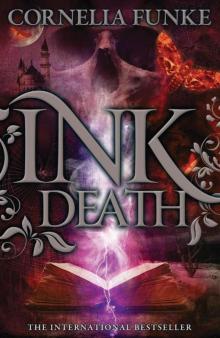 Inkdeath
Inkdeath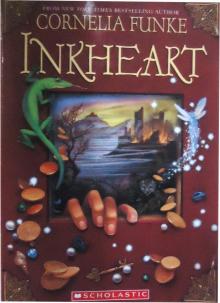 Inkheart
Inkheart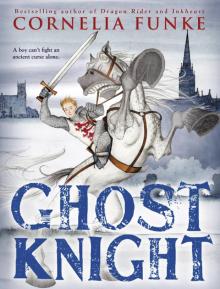 Ghost Knight
Ghost Knight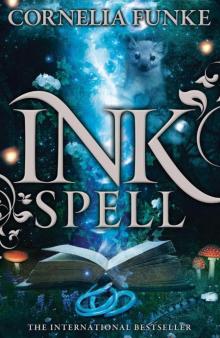 Inkspell
Inkspell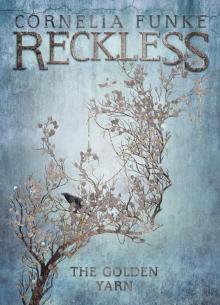 The Golden Yarn
The Golden Yarn Fearless
Fearless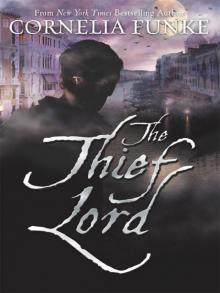 The Thief Lord
The Thief Lord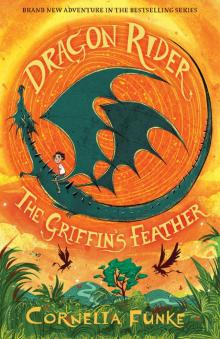 The Griffin's Feather
The Griffin's Feather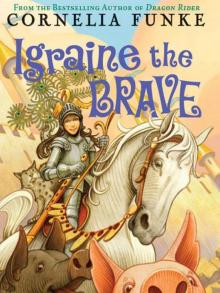 Igraine the Brave
Igraine the Brave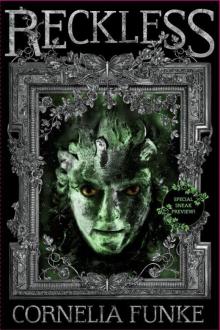 Reckless
Reckless When Santa Fell to Earth
When Santa Fell to Earth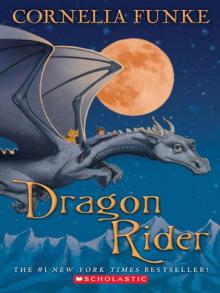 Dragon Rider
Dragon Rider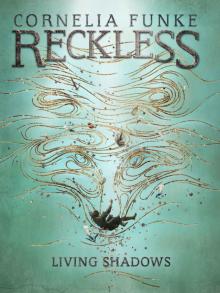 Living Shadows
Living Shadows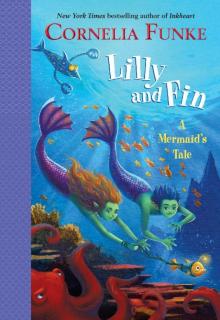 Lilly and Fin: A Mermaid's Tale
Lilly and Fin: A Mermaid's Tale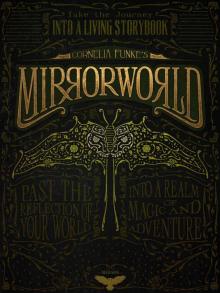 The MirrorWorld Anthology
The MirrorWorld Anthology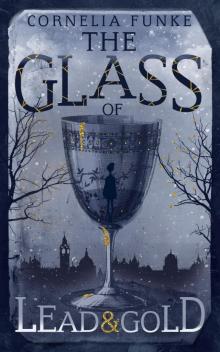 The Glass of Lead and Gold
The Glass of Lead and Gold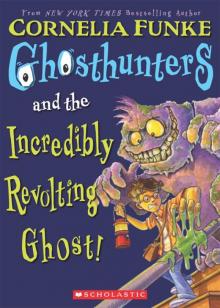 Ghosthunters and the Incredibly Revolting Ghost
Ghosthunters and the Incredibly Revolting Ghost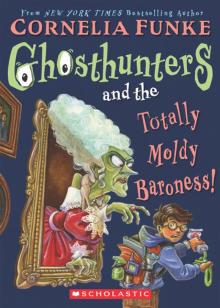 Ghosthunters and the Totally Moldy Baroness!
Ghosthunters and the Totally Moldy Baroness!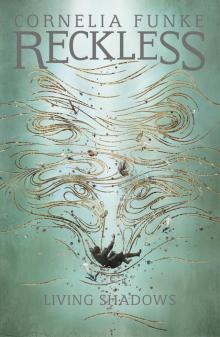 Reckless II
Reckless II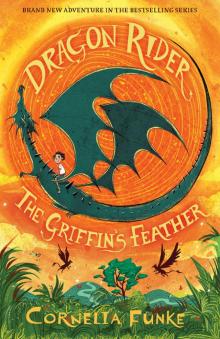 Griffin's Feather
Griffin's Feather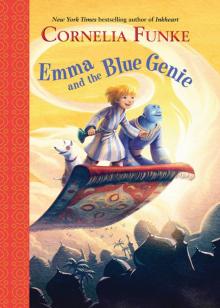 Emma and the Blue Genie
Emma and the Blue Genie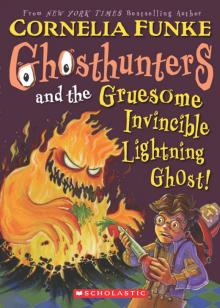 Ghosthunters and the Gruesome Invincible Lightning Ghost
Ghosthunters and the Gruesome Invincible Lightning Ghost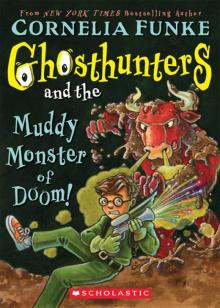 Ghosthunters and the Muddy Monster of Doom!
Ghosthunters and the Muddy Monster of Doom!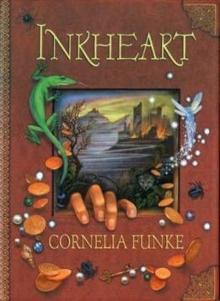 Inkheart ti-1
Inkheart ti-1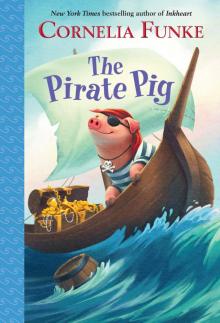 The Pirate Pig
The Pirate Pig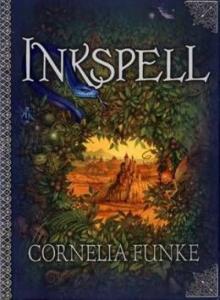 Inkspell ti-2
Inkspell ti-2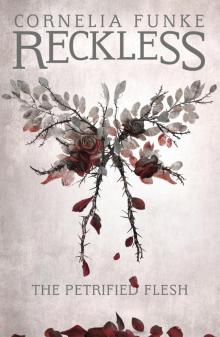 The Petrified Flesh
The Petrified Flesh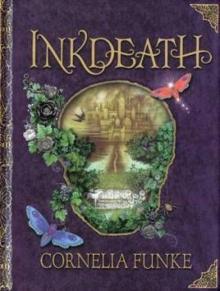 Inkdeath ti-3
Inkdeath ti-3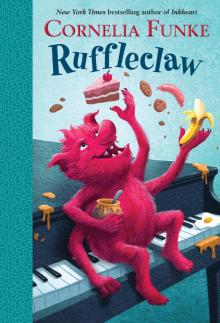 Ruffleclaw
Ruffleclaw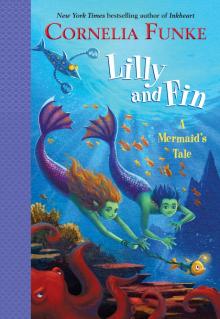 Lilly and Fin
Lilly and Fin